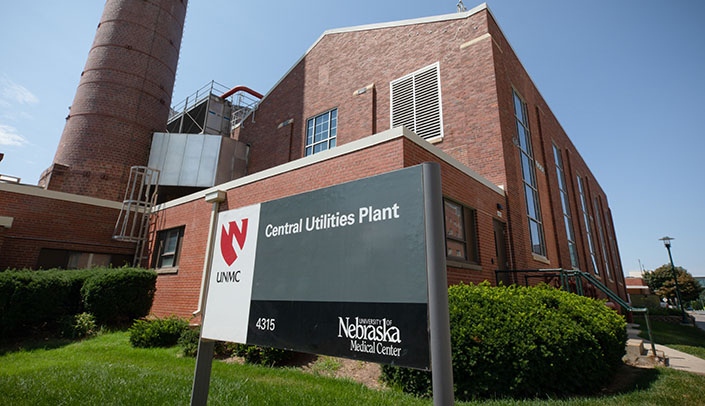A new piece of equipment is poised to capture energy that previously would’ve been wasted — enough of it to heat three huge buildings. To explain how it works, a little lesson in how the utilities work at the UNMC/Nebraska Medical Center campus.
The Central Utility Plant (CUP) is the main hub for utilities (electricity and natural gas). From there, electricity is distributed to buildings and the CUP cools buildings by producing chilled water, heats buildings by creating steam, and produces hot water. These processes use electricity and/or natural gas.
The “smoke” stack is equivalent to the vent on virtually all homes. It’s where the exhaust from burning natural gas leaves the building and where many of our greenhouse gas emissions come from. Exhaust tends to be more visible when it’s cold out, as the temperature differential is greater. We are always producing hot water and heat (that’s the seemingly backwards part of energy curtailment), so we are always burning natural gas. Though the amount of exhaust coming out of our stack can vary based on time of day/campus activities, there is always exhaust.
A lot of what is exhausted is heat, but getting rid of heat while working to produce it isn’t the most efficient process. That’s where the flue gas economizer comes in. Flue like a chimney flue, not the virus. The flue gas economizer is not your everyday piece of equipment. Operated by the CUP technicians, it pulls heat that would be exhausted out of the stack and allows it to be used to as heat for buildings.
So how efficient is it?
When it’s cold outside and running at full capacity, it is capable of providing enough heat for the Lauritzen Outpatient Center, UNMC Center for Drug Discovery and Lozier Center for Pharmacy Science and Education, and the new Dr. Edwin G. & Dorothy Balbach Davis Global Center.
You read that correctly: all three buildings can be completely heated with energy that would have been previously wasted. Pretty cool (or, uh, hot), isn’t it?
Adam Poppleton, utilities operations supervisor said, “This equipment demonstrates not only our drive to reduce emissions, improve air quality and positively impact health but also to use innovative technology.”
In a one-year time period, the campus added more than a million square feet of built space (which doesn’t count the Davis Global Center). That means energy use goes up, and so do emissions. While the flue gas economizer doesn’t directly reduce emissions, it reduced the amount of increase, assisting with our goal to be Net Zero Building Emissions by 2030 and saving money on both capital equipment and utilities.

This is pretty cool! Thank you for working hard to help create a more sustainable UNMC/Med Center!
Great article Melanie!!!
This is an impressive step forward.